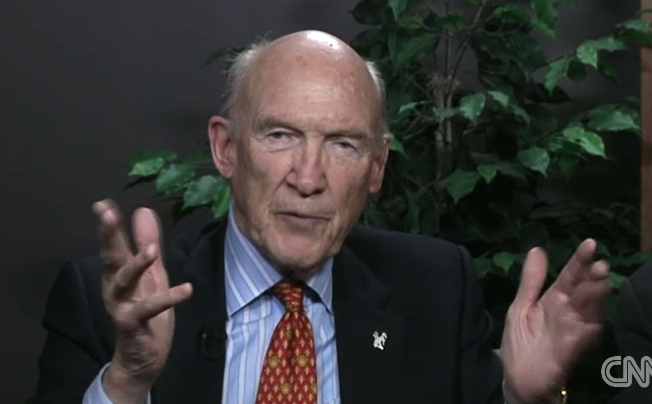A Monday confab at the Center for Strategic and International Studies in Washington brought together a mix of former defense officials, beltway-famous defense hawks and budget deficit scolds to air a shared view: across the board cuts to defense programs set to kick in early next year are a terrible way to reduce the deficit, which must be reduced, but in some other way.
The three-hour long forum featured presentations from Admiral Mike Mullen, former chairman of the joint chiefs; former defense secretary Robert Gates, and Erskine Bowles and Alan Simpson, the vaudevillian duo who chaired President Obama’s commission on fiscal responsibility, among many others.
The panelists applauded each other and their colleagues for proposing a variety of program cuts and revenue increases that they hope will stabilize the country’s rising debt-to-GDP ratio. But they couldn’t bring themselves to contend with the single longest-standing impediment to progress on their pet issues: the GOP’s unwillingness to support higher taxes.
Instead, as is typical, the issue was framed as two parties at ideological loggerheads that refuse to compromise, resulting in a dysfunctional political system. That was the gist of of remarks by Alice Rivlin, who directed President Bill Clinton’s Office of Management and Budget.
“The arithmetic drives any bipartisan groups, using realistic projections, to the same conclusion: bringing the debt under control without derailing the economy must involve a combination of three elements,” said Rivlin. “Entitlement reform … is the hard part for Democrats, but it’s absolutely necessary — we can’t solve this problem without it, although entitlement reform won’t help very much in the near term. The second part is tax reform that raises additional revenues from a tax code that is simpler and less of a drag on economic growth and remains at least as progressive as the one we have now … that’s the part that’s hard for Republicans. Thirdly, we do need reductions in the growth of defense and domestic appropriations designed to improve the efficiency and effectiveness of both sets of programs. This is hard for everybody, but the good news is it’s already happening.”
This is true to a point, but it downplays a key fact about the country’s fiscal predicament for the past two decades. Democrats have voted for cuts to Medicare and other programs, in both partisan and bipartisan reforms, many times over the years. Republicans have not voted for tax increases since 1991, when George H.W. Bush was president. Not only that but Republicans’ chief legislative legacy of the last decade — the George W. Bush tax cuts — is a major source of structural deficits right now, and Republicans, up to and including presidential nominee Mitt Romney, refuse to support lifting revenues above that baseline.
That deep, ideologically driven GOP intransigence, more than any other single obstacle, explains Congress’ recent failure to reach accord on a big deficit reduction plan. It explains House Speaker John Boehner’s inability to corral support from his caucus for a grand bargain with President Obama. But when the leaders of the fiscal responsibility movement in Washington come together, it strangely almost never comes up.
Simpson came the closest. “You’ve gotta clear out the real underbrush of Grover Norquist,” he said referring to the conservative anti-tax activist who has obtained commitments from the vast majority of GOP congressmen to never effectively raise taxes. But Simpson quickly equated GOP anti-tax absolutism to the less intense efforts of senior groups to prevent changes to entitlement benefits. “You’ve gotta take this guy [Norquist] on, because if you can’t get Grover Norquist and shoot him over the moon, and you can’t do something with the AARP and these congresspeople are in thrall to Grover Norquist and the AARP, we ain’t gotta prayer.”
And yet most panelists were far less specific in their criticisms.
“In order to maintain strong institutions of national defense and international influence, the United States must get its government finances in order,” said Gates, a Republican who served under President Obama. “Doing so requires our country’s political class to show leadership and make decisions that may be unpopular in the short run but will strengthen the country for the long haul. So far there appears to be little evidence that this is taking place.”










